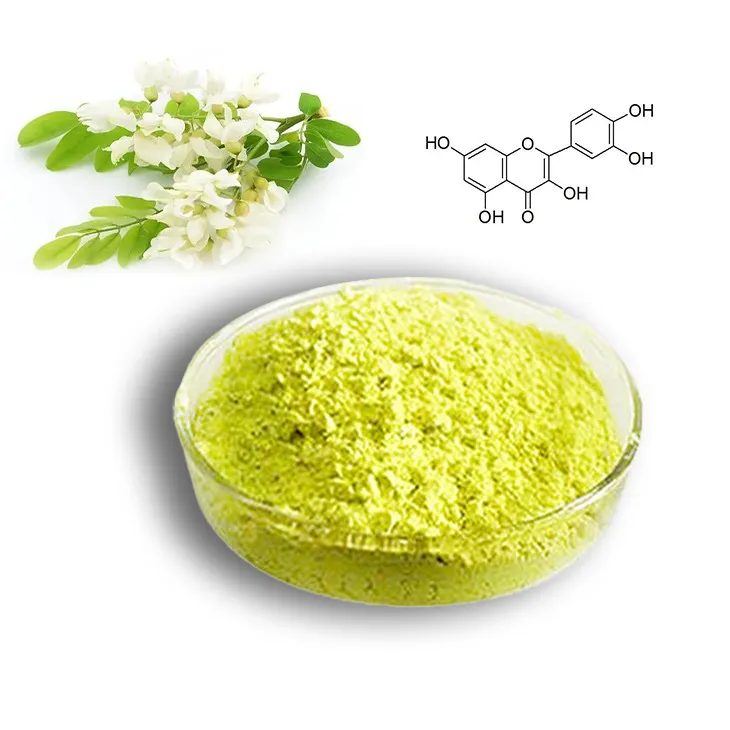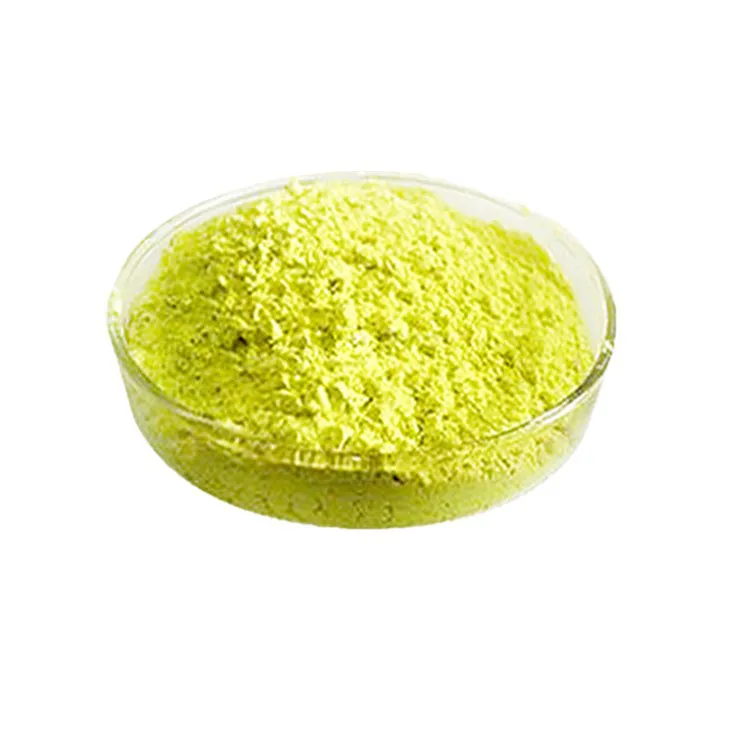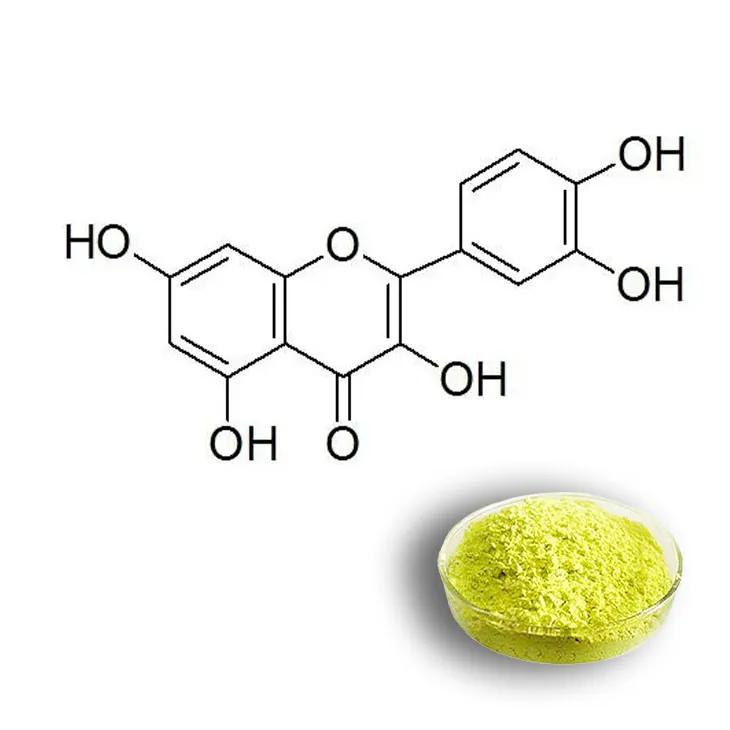- 0086-571-85302990
- sales@greenskybio.com
Is quercetin beneficial for diabetes? Are these all safe and applicable for diabetic patients?
2024-11-12

1. Introduction
Diabetes is a chronic metabolic disorder that affects millions of people worldwide. It is characterized by high blood glucose levels due to either insufficient insulin production or the body's inability to effectively use insulin. Management of diabetes often involves lifestyle changes, medication, and sometimes dietary supplements. Quercetin, a flavonoid found in many fruits, vegetables, and grains, has been the subject of much research regarding its potential benefits in diabetes. This article will explore the relationship between Quercetin and diabetes, including its potential benefits and safety considerations for diabetic patients.

2. What is Quercetin?
Quercetin is a plant - derived flavonoid that belongs to a group of polyphenolic compounds. It is found in a wide variety of foods such as onions, apples, berries, broccoli, and green tea. Quercetin has antioxidant, anti - inflammatory, and anti - apoptotic properties. These properties are thought to be responsible for its potential health benefits in various conditions, including diabetes.

3. The Potential Benefits of Quercetin in Diabetes
3.1. Glucose Regulation
Several studies have suggested that quercetin may play a role in glucose regulation. In animal models of diabetes, quercetin has been shown to improve insulin sensitivity and lower blood glucose levels. For example, one study found that quercetin treatment in diabetic rats led to a reduction in fasting blood glucose levels and an improvement in glucose tolerance. The mechanism behind this may be related to its ability to activate certain signaling pathways involved in glucose metabolism, such as the AMP - activated protein kinase (AMPK) pathway. Activation of AMPK can enhance insulin sensitivity and promote glucose uptake in cells.
3.2. Anti - Inflammatory Effects
Chronic inflammation is associated with the development and progression of diabetes. Quercetin's anti - inflammatory properties may be beneficial for diabetic patients. It can inhibit the production of pro - inflammatory cytokines such as interleukin - 6 (IL - 6) and tumor necrosis factor - alpha (TNF - α). By reducing inflammation, quercetin may help to prevent or delay the onset of diabetes - related complications, such as diabetic nephropathy, neuropathy, and retinopathy.
3.3. Antioxidant Activity
Oxidative stress is another factor that contributes to the pathophysiology of diabetes. High blood glucose levels can lead to an increase in the production of reactive oxygen species (ROS), which can damage cells and tissues. Quercetin is a powerful antioxidant that can scavenge ROS and protect cells from oxidative damage. This may help to maintain the normal function of pancreatic beta - cells, which are responsible for insulin production, and also protect other tissues affected by diabetes, such as the blood vessels, nerves, and kidneys.

4. Scientific Research on Quercetin and Diabetes
A number of scientific studies have been conducted to investigate the effects of quercetin on diabetes. In addition to the animal studies mentioned above, some human studies have also provided evidence of its potential benefits. For instance, a small - scale clinical trial found that supplementation with quercetin in type 2 diabetic patients led to a modest reduction in fasting blood glucose levels and an improvement in lipid profiles. However, it should be noted that the results of these studies are not always consistent, and more research is needed to fully understand the relationship between quercetin and diabetes.
4.1. Limitations of Current Research
One of the main limitations of current research on quercetin and diabetes is the relatively small sample sizes in many of the studies. Small sample sizes may lead to less reliable results and make it difficult to draw definitive conclusions. Additionally, the duration of most studies has been relatively short, which may not be sufficient to observe long - term effects. Another issue is the lack of standardization in the dosage and form of quercetin used in different studies. This can make it challenging to compare the results across studies.

5. Safety of Quercetin for Diabetic Patients
In general, quercetin is considered safe for most people when consumed in normal dietary amounts. However, when it comes to diabetic patients, there are some additional considerations.
5.1. Interaction with Medications
Diabetic patients often take medications to control their blood glucose levels. Quercetin may interact with some of these medications. For example, it has been suggested that quercetin may enhance the effects of hypoglycemic drugs, which could potentially lead to hypoglycemia (low blood sugar). Therefore, diabetic patients who are considering taking quercetin supplements should consult their healthcare provider to ensure that there are no potential interactions with their current medications.
5.2. Dosage Considerations
While quercetin is found in foods, the amount present in dietary sources may not be sufficient to achieve the potential therapeutic effects. However, when taking quercetin supplements, it is important to adhere to the recommended dosage. High doses of quercetin may cause adverse effects such as gastrointestinal discomfort, including nausea, vomiting, and diarrhea. For diabetic patients, finding the right dosage that balances potential benefits and safety is crucial.
6. Practical Applications
Given the potential benefits of quercetin in diabetes, some diabetic patients may be interested in incorporating it into their management plan.
6.1. Dietary Sources
One way to increase quercetin intake is through dietary sources. As mentioned earlier, foods such as onions, apples, berries, broccoli, and green tea are rich in quercetin. Including these foods in the diet can be a natural and safe way to potentially benefit from quercetin's properties. For example, adding onions to salads or cooking with them, eating an apple a day, or drinking green tea regularly can all contribute to quercetin intake.
6.2. Supplements
If a diabetic patient decides to take quercetin supplements, they should choose a high - quality product from a reputable manufacturer. It is also advisable to start with a low dose and gradually increase it while monitoring for any adverse effects. As always, consulting a healthcare provider before starting any new supplement is essential.
7. Conclusion
Quercetin shows potential benefits in diabetes, including glucose regulation, anti - inflammatory, and antioxidant effects. However, more research is needed to confirm these benefits and to better understand its long - term safety for diabetic patients. Diabetic patients should be cautious when considering quercetin supplementation, especially in terms of potential interactions with medications and proper dosage. Incorporating quercetin - rich foods into the diet can be a safer alternative for those who want to explore the potential benefits of this flavonoid. Overall, while quercetin holds promise in the context of diabetes management, further investigation is required to fully realize its potential.
FAQ:
What is quercetin?
Quercetin is a flavonoid, a type of plant pigment with antioxidant properties. It is found in many fruits, vegetables, and grains, such as apples, onions, and buckwheat.
How might quercetin be beneficial for diabetes?
Some scientific research suggests that quercetin may help with diabetes in several ways. It may improve insulin sensitivity, which means cells can better respond to insulin and take up glucose from the blood. It also has antioxidant effects that can reduce oxidative stress, which is often elevated in diabetes and can contribute to complications. Additionally, it may have anti - inflammatory properties, and chronic inflammation is associated with diabetes.
Is quercetin safe for diabetic patients?
Generally, when consumed in normal dietary amounts, quercetin is considered safe for most people, including diabetic patients. However, in high - dose supplement form, there may be some potential risks. For example, it could interact with certain medications. Also, some people may experience side effects like stomach upset or allergic reactions, although these are relatively rare.
Can quercetin replace diabetes medications?
No. While quercetin may have some beneficial effects on diabetes, it should not be used as a replacement for prescribed diabetes medications. Diabetes medications are specifically designed to regulate blood sugar levels, and their effectiveness has been proven through extensive clinical trials. Quercetin can be considered as a complementary approach, but only under the guidance of a healthcare provider.
How can diabetic patients incorporate quercetin into their diet?
Diabetic patients can increase their quercetin intake by consuming more foods rich in quercetin. For example, they can eat more apples (with the skin), onions, berries, and leafy green vegetables. If considering quercetin supplements, it is crucial to consult a doctor first to ensure it is appropriate and safe, especially considering potential interactions with other medications.
Related literature
- Quercetin and Diabetes: An Overview of Potential Mechanisms and Therapeutic Applications"
- "The Role of Quercetin in the Management of Diabetes Mellitus: A Review of the Current Evidence"
- "Quercetin - Induced Effects on Glucose Homeostasis in Diabetic Models: A Systematic Review"
- ▶ Hesperidin
- ▶ citrus bioflavonoids
- ▶ plant extract
- ▶ lycopene
- ▶ Diosmin
- ▶ Grape seed extract
- ▶ Sea buckthorn Juice Powder
- ▶ Beetroot powder
- ▶ Hops Extract
- ▶ Artichoke Extract
- ▶ Reishi mushroom extract
- ▶ Astaxanthin
- ▶ Green Tea Extract
- ▶ Curcumin Extract
- ▶ Horse Chestnut Extract
- ▶ Other Problems
- ▶ Boswellia Serrata Extract
- ▶ Resveratrol Extract
- ▶ Marigold Extract
- ▶ Grape Leaf Extract
- ▶ blog3
- ▶ blog4
- ▶ blog5
-
Organic Tongkat Ali extract powder factory.
2024-11-12
-
How to make powder with ashwagandha extract.
2024-11-12
-
Rosehip extract manufacturers from China.
2024-11-12
-
The best cat's claw extract in nature.
2024-11-12
-
Chinese Dandelion Leaf Extract Suppliers.
2024-11-12
-
Beetroot Powder
2024-11-12
-
Reishi mushroom extract
2024-11-12
-
Hesperidin
2024-11-12
-
Cat Claw Extract
2024-11-12
-
Bayberry Extract
2024-11-12
-
Lemon Balm Extract
2024-11-12
-
Pine bark Extract Powder
2024-11-12
-
Feverfew Extract
2024-11-12
-
Camu Camu Extract
2024-11-12
-
Medicinal Marshmallow Extract
2024-11-12





















